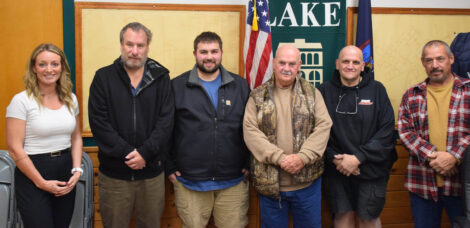Green grants
Village board debates how to split cannabis revenue between grant program and general fund
SARANAC LAKE — The village board is discussing sparking up a cannabis sales tax grant program, and will hold a work session on a proposed law at its next meeting on Monday.
This program would be similar to the one the town of North Elba established in July 2024.
Trustee Kelly Brunette’s been working on Saranac Lake’s proposal for a while. She brought a proposal to the board at its Nov. 10 meeting.
The full proposed law can be found at tinyurl.com/4tk9p26j starting on page 45.
There’s debate on the board over how to use the cannabis tax revenue — how much should go to this grant program — and how much should go to the village’s general fund.
Mayor Jimmy Williams sees it as a way to avoid tax increases, a new revenue stream to lessen the tax burden by bolstering the general fund.
Brunette does not want to use the cannabis tax to plug the budget. It’s not a reliable source, she felt. The law could change, the revenue could fluctuate and the village does not have control over it.
Trustee Aurora White said these funds can be spent on things regular tax dollars can’t be spent on.
Brunette proposed a 50/50 split between the general fund and the grant program.
Trustee Matt Scollin liked this plan, too, adding that they should review that percentage annually.
“Maybe starting low is the way to go,” Brunette said.
Every sale of cannabis is taxed at 13% — 4% of that is a local tax. Of that 4%, 75% is allocated to the municipalities where the sales occur. This tax is split 50/50 between the town and the village.
Currently, the only licensed dispensary in the Tri-Lakes is Elevate ADK, which is in the village of Saranac Lake and the town of North Elba. Alpine Agronomy, a cannabis cultivation facility in the village of Saranac Lake and town of Harrietstown, has been licensed to start dispensary sales but has not opened yet.
The village has accumulated a little more than $95,000 in cannabis tax revenue since Elevate opened in May 2023. Cannabis tax funds are paid out to the village quarterly. The state overpaid the village last year through an accounting error, so the village has not been getting payments since August 2024 to make up for it. Village Manager Bachana Tsiklauri said the village got a $3,000 check last week, indicated that they are caught up. But the error has made it a bit more difficult to estimate how much revenue they can expect each quarter. Tsiklauri estimated a potential $10,000 to $15,000 quarterly.
Tsiklauri wants to use the cannabis revenue already received for a new snowmaking pump at the village-owned ski area at Mount Pisgah. He plans to bring a resolution to the board requesting those accumulated funds to be used for this soon.
He said, if they can’t make these upgrades, this might be the last season they have snowmaking with this existing system. He estimates the entire project will cost $300,000.
Brunette’s resolution proposes a maximum grant of $5,000 per application, but that number is up in the air, she said.
The program would be administered by the village manager, who would review applications and bring qualifying ones to the board for approval.
This fund would be used to reinvest in the community by funding eligible projects and initiatives that benefit residents, prioritizing youth, seniors and recreation. All proposals must align with one of these priority groups.
Applications could only be made by non-profits or those with a non-profit sponsor. Applications could be accepted on a rolling basis. The funds could not be used to pay salaries or wages, and would not be allowed to be applied to costs retroactively.
White said the cannabis tax grant program would allow the village to give money to the groups who come to the village to request money for their events — things like the adult, youth and civic centers; the arts, music festivals and other events.
Brunette said she’d rather use the tax money on these things instead of just putting it in the general fund.
Williams said all those things can also get occupancy tax grants, which he felt are not being leveraged enough. White said the village doesn’t have access to those occupancy tax funds because of how Franklin County is managing them.
Williams said the village is coming up on several big projects and that “every dollar counts” in the budget.
Brunette wanted to work on the proposal during the meeting. Williams felt they should wait and hold a work session. The meeting was a long one and was bookended by an hour-and-a-half of executive sessions.
Williams felt he does not agree with the resolution and that the board needs to work out the details.
Trustee Sean Ryan said the money in the fund will spend fast and they need to work on the process.
“It’s going to be gone so quick,” Ryan said. “How are we going to prioritize yeses versus nos?”
Brunette said she was frustrated that they spend this much time talking about how to distribute $50,000, which is “small change” compared to the $30 million or $40 million projects the village is looking at.
White said she’s tired of tabling things for work sessions. This delays and prolongs action, she said. The cannabis tax program has been put off for months, she said.
Scollin disagreed with the idea that work sessions are where things go to die. He feels they do some of their best work in those.
The board began arguing over a whole bunch of things — relating to the proposed law, the work session on the law and circling around to a range of other disagreements on other issues. This bickering dragged on for quite a while and the mood on the board was palpably tense.
“We’ve spent three minutes talking about the bill and we’ve spent 10 minutes throwing accusations at everyone,” Ryan said. “And this is why we need a work session.”
“I think we need a therapy session,” White said.
Ryan said they need to sit down and focus on the bill. Anytime a topic is brought up in the regular agenda it becomes about something else and leads to an argument, he said.
Scollin said they should prove to themselves that they can do it — get through the work session and take a vote at the next meeting.
Jeremy Evans, a village resident and member of the Harrietstown Council suggested the village take a note from the public planning philosophy of “tactical urbanism” — making quick, temporary changes to see what works before putting big bucks on big changes.
He said the state comptroller would likely say that using funds to plug the budget is not the right thing to do.
Evans said the cannabis tax rollout has been a “disaster” at the state level, which makes it not dependable.
He said North Elba’s grant program is a “great model” for Saranac Lake.
The work session on Monday will be at the meeting, which starts at 5 p.m. in the upstairs board room of the Harrietstown Town Hall.



